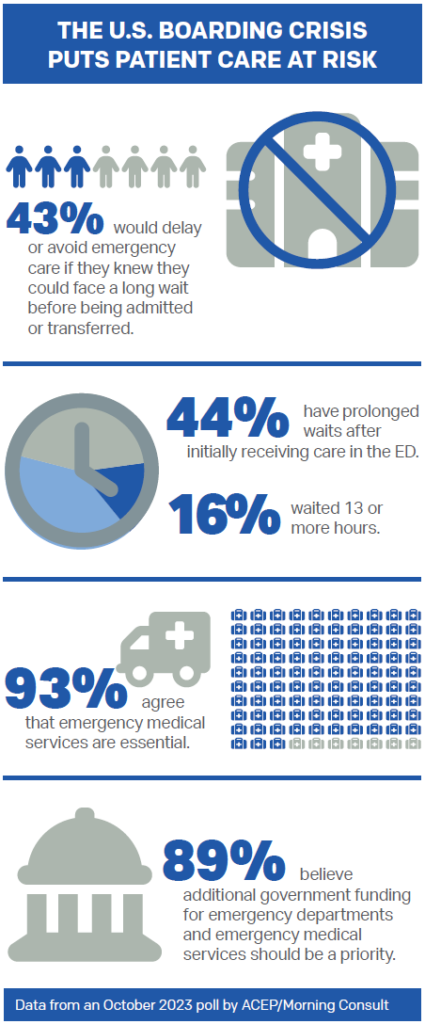Boarding in the emergency department is a systemic crisis with emergency physicians at the center. While the challenges related to boarding have persisted for decades, the dangers today are unprecedented, and solutions are beyond any individual physician or hospital effort.
Explore This Issue
ACEP Now: Vol 42 – No 12 – December 2023ACEP said as much to the White House by writing a powerful letter in November 2022 supported by 34 organizations to show how serious the issue has become. To date, there has been no formal response from the Administration.
Absent federal action, the College took the lead to identify and pursue collaborative solutions.
On Sept. 27, ACEP organized and led the first national stakeholder summit on boarding. Medical societies, state and federal government leaders, hospital and nursing home representatives, and patient advocates assembled in the ACEP DC office for a day-long dialogue on the boarding crisis.
“Boarding is a disaster, but there’s no disaster plan for it,” said David Sklar, MD, FACEP the chair of the ACEP Boarding Task Force. “This can be prevented.”
The summit participants examined the multifactorial causes of boarding through the lens of transparency, regulatory challenges, mental health, financial drivers, operational modifications, workforce, and other categories. A detailed summary of the proceedings is available at acep.org/boarding.
Participants began by going around the room, highlighting current efforts that are working and other measures that fall short, with a focus on local, state and national government actions that could mitigate the crisis.
Summit participants agreed that better data collection could inform and improve processes and decision making in many ways.
Centralized and standardized resource tracking, increased state and local access to preparedness data, and better information sharing across systems regarding capacity, staffed bed availability, and other important measures were prominent among suggestions that could greatly improve efficiencies. The critical importance of interoperability and transparency was noted.
The discussion revealed worrisome gaps in federal efforts to address factors that exacerbate the crisis.
“Most of the causes are outside of the emergency department, we just end up being ground zero,” said Laura Wooster, ACEP Senior Vice President, Advocacy and Practice Affairs.
Special focus was paid to workforce issues, an area in which ACEP has been sounding the alarm for months.
Multiple stakeholders emphasized the importance of sharpening the focus, as well as refining the federal and state review of training programs for nurses and long-term care workers. Support was broadly affirmed for practical measures such as increasing nursing program slots and increasing incentives for workers in rural communities.
Pages: 1 2 3 | Single Page



No Responses to “ACEP Leads National Summit on the Boarding Crisis”